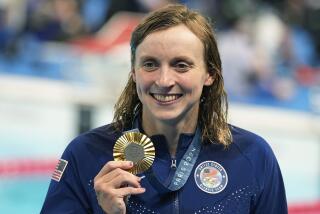U.S. Olympic Festival : Swimmer Says He’s Inspired
- Share via
OKLAHOMA CITY — As he watched Al Campanis, speak of blacks’ “lack of buoyancy,” during a television interview two years ago, Manuel Twillie said he remembers laughing at the national indiscretion.
“It was kind of funny to me,” Twillie said. “I just thought, ‘I guess he hasn’t seen me swim.’ ”
Since that infamous “Nightline” program, Twillie has kept Campanis’ comments tucked carefully away in his subconscious, always available as a motivational tool. They come in handy, too, especially with another 50 meters to go in a race or another 500 meters left in a practice session. For this, Twillie thanks the former Dodger general manager.
“It’s a drive for me in swimming, to prove him wrong,” Twillie said.
Consider it done. Twillie, 17, already finds himself one of only a handful of black elite-caliber swimmers in the country. Of the 104 swimmers invited to the U.S. Olympic Festival, Twillie, who lives in Little Rock, Ark., and Danielle Strader, 14, of Madison, Wis., are the lone blacks.
“It really is a big deal,” he said. “I’m the pioneer, like Jesse Owens was. I’m the pioneer for swimming, I guess.”
Twillie was 3 when his mother took him to pool for the first time. Swim lessons followed, as did the realization that few blacks pursued the sport. “When you’re a little kid, everyone’s like you,” he said. “Later, maybe when I was 12 or something, it just came to me: ‘You know, I don’t see many black swimmers here.’ And when I did see someone, I’d say, ‘Let me go talk to this guy.’ ”
What he discovered was that the cost of competitive swimming discouraged some blacks. It is not a sport, he said, where all you need is a swimsuit and a pair of goggles. Lessons can be expensive, as can travel costs to important meets.
U.S. Swimming, the national governing body for the sport, has its own theories on why black participation is modest, at best. “Purely sociological,” said U.S. Swimming spokesman Jeff Dimond.
With that in mind, U.S. Swimming officials have enlisted Twillie’s help in the recruiting process. They asked for a photograph and biography, the better to showcase the 6-foot-3, 195-pound Twillie. He happily obliged. And when the four regional teams were introduced at the Oklahoma City Community College pool, Twillie, whose specialty is the 100-meter butterfly, took his place as captain of the West men’s squad.
Twillie would like nothing better than to earn a place on the 1992 Olympic roster and again in 1996. “Maybe set a couple of records,” he said.
He is given an outside chance, say U.S. Swimming officials, especially if his times continue to improve against national and international competition. That’s what the Olympic Festival is for: to give him a glimpse of things to come.
On Wednesday evening, Twillie finished 10th in his favorite race, more than two seconds behind the winner, Dan Kutler. It wasn’t his best race, but then again, it wasn’t his worst, either. After all, there were six other Festival swimmers with worse times.
In fact, his regret of the night had little to do with the stopwatch.
“I wouldn’t mind if he was here,” Twillie said.
He? Twillie smiled.
Of course--Campanis.
Festival Notes
“Moose Causes Mohr To Miss Festival,” said the news release headline posted Wednesday morning. True story: Ron Mohr, a member of the Team USA’s national bowling team, was bicycling near his Anchorage, Alaska, home when a moose crossed the path. Mohr swerved in time to miss the moose, but by doing so, fell and broke his collarbone and right arm. The bizarre injury not only cost him his place on the Festival roster, but also might mean he can’t qualify for next month’s USA National Finals. . . . John Kennedy of Middlesex, N.J., claimed the Festival’s 200-meter freestyle record as his own. His time of 1:53.10 was the first individual record broken after two days of competition. A night earlier, Kennedy won the 400-meter freestyle.
More to Read
Go beyond the scoreboard
Get the latest on L.A.'s teams in the daily Sports Report newsletter.
You may occasionally receive promotional content from the Los Angeles Times.






